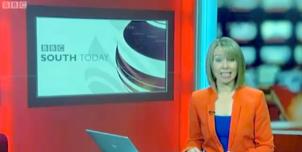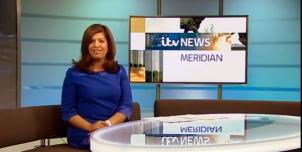Full Freeview on the Oxford (Oxfordshire, England) transmitter
| Google Streetview | Google map | Bing map | Google Earth | 51.790,-1.179 or 51°47'25"N 1°10'46"W | OX3 9SS |
The symbol shows the location of the Oxford (Oxfordshire, England) transmitter which serves 410,000 homes. The bright green areas shown where the signal from this transmitter is strong, dark green areas are poorer signals. Those parts shown in yellow may have interference on the same frequency from other masts.
_______
Digital television services are broadcast on a multiplexes (or Mux) where many stations occupy a single broadcast frequency, as shown below.
64QAM 8K 3/4 27.1Mb/s DVB-T MPEG2
DTG-12 QSPK 8K 3/4 8.0Mb/s DVB-T MPEG2
H/V: aerial position (horizontal or vertical)
Which Freeview channels does the Oxford transmitter broadcast?
If you have any kind of Freeview fault, follow this Freeview reset procedure first.Digital television services are broadcast on a multiplexes (or Mux) where many stations occupy a single broadcast frequency, as shown below.
64QAM 8K 3/4 27.1Mb/s DVB-T MPEG2
DTG-12 QSPK 8K 3/4 8.0Mb/s DVB-T MPEG2
H/V: aerial position (horizontal or vertical)
Which BBC and ITV regional news can I watch from the Oxford transmitter?

BBC South (Oxford) Today 0.4m homes 1.6%
from Oxford OX2 7DW, 6km west-southwest (258°)
to BBC South (Oxford) region - 6 masts.
BBC South (Oxford) Today shares 50% content with Southampton service

ITV Meridian News 0.9m homes 3.4%
from Whiteley PO15 7AD, 102km south (182°)
to ITV Meridian/Central (Thames Valley) region - 15 masts.
Thames Valley opt-out from Meridian (South). All of lunch, weekend and 50% evening news is shared with all of Meridian+Oxford
How will the Oxford (Oxfordshire, England) transmission frequencies change over time?
| 1950s-80s | 1984-97 | 1997-98 | 1998-2011 | 2011-13 | 2013-18 | 2013-17 | 23 May 2018 | ||
| VHF | C/D E | C/D E | C/D E | C/D E | C/D E T | W T | W T | ||
| C2 | BBCtvwaves | ||||||||
| C29 | SDN | ||||||||
| C31 | com7 | com7 | |||||||
| C37 | com8 | com8 | |||||||
| C41 | BBCA | ||||||||
| C44 | D3+4 | ||||||||
| C46 | _local | ||||||||
| C47 | BBCB | ||||||||
| C49tv_off | C5waves | C5waves | |||||||
| C50tv_off | SDN | SDN | |||||||
| C51tv_off | LOX | LOX | |||||||
| C53tv_off | C4waves | C4waves | C4waves | +BBCA | +BBCA | +BBCA | |||
| C55tv_off | ArqB | ArqB | ArqB | com7tv_off | |||||
| C56tv_off | COM8tv_off | ||||||||
| C57tv_off | BBC1waves | BBC1waves | BBC1waves | BBCB | BBCB | BBCB | |||
| C59tv_off | -ArqA | -ArqA | -ArqA | ||||||
| C60tv_off | ITVwaves | ITVwaves | ITVwaves | -D3+4 | -D3+4 | -D3+4 | |||
| C62 | SDN | ||||||||
| C63 | BBC2waves | BBC2waves | BBC2waves |
tv_off Being removed from Freeview (for 5G use) after November 2020 / June 2022 - more
Table shows multiplexes names see this article;
green background for transmission frequencies
Notes: + and - denote 166kHz offset; aerial group are shown as A B C/D E K W T
waves denotes analogue; digital switchover was 14 Sep 11 and 28 Sep 11.
How do the old analogue and currrent digital signal levels compare?
| Analogue 1-4 | 500kW | |
| BBCA, D3+4, BBCB | (-7dB) 100kW | |
| SDN, ARQA, ARQB | (-10dB) 50kW | |
| Analogue 5 | (-11dB) 40kW | |
| com8 | (-14.7dB) 17.1kW | |
| com7 | (-14.8dB) 16.4kW | |
| Mux 1*, Mux 2*, LOX | (-17dB) 10kW | |
| Mux C*, Mux D* | (-18dB) 8kW | |
| Mux A*, Mux B* | (-19.2dB) 6kW |
Which companies have run the Channel 3 services in the Oxford transmitter area
|
|
Wednesday, 19 October 2011
Mike Dimmick: I can't help noticing that funding for "Digital UK" will dry up once the last switchover event has taken place, so I can't help wondering if "Digital UK" will have anything to do with post-2012 changes to the broadcasting arrangements, beyond what is arranged for pre-DSO stations.
I will have to go though http://licensing.ofcom.or….pdf and look for all the relevant changes.
I suppose there is a possibility that the post-2012 changes shown here are caused by changes from international stations, as they are for the Brighton area.
| link to this comment |
Thursday, 20 October 2011
A
Algernon Black5:54 PM
Thanks for the reply on "variable reception" from Oxford next year. I live near Northleach in Gloucestershire at 752 feet above sea level.
All along their "post code checker" has been somewhat dodgy and taking into account your comments I suspect my reception will not change much, if at all.
I note that the digital change over in the USA took place on one night, that is, all stations coast to coast in one night, pity our lot couldn't manage that!
Keep up the good work.
Algy.
| link to this comment |
Friday, 21 October 2011
Algernon Black: In the US there were sufficient frequencies for the full power replacement digital services to be in operation for many years.
This is because the US terrestrial system is city based and does not cover what we would term "rural areas".
So, the US was a "switch off analogue" event, not a "switchover event" as here, where the low power digital and high power analogue services are replaced with high power digital.
With almost 100% coverage in the UK, this means a rolling switchOVER plan.
It is highly unfair to compare different implementations.
| link to this comment |
Saturday, 22 October 2011
A
andrew9:13 PM
Why are some of the multiplexes transmitting on low power?is it to save electricity?
| link to this comment |
Sunday, 23 October 2011
M
Mark Fletcher12:07 AM
Andrew.The SDN,ArqA & ArqB mux's from the main Oxford transmitter are transmitting on lower power not to save electricity,it is more a case of avoiding clashes with nearby regional transmitters/relays that are either now all digital,or still broadcasting analogue and low powered pre-digital switched signals using the same frequencies as that of the Oxford mast,more so the current understrength SDN ch62,ArqA ch59 & ArqB ch 55 mux's which had they're been on full power by now will affect nearby transmitters/relays broadcasting on ch 55,ch59,ch62 whether already digitally switched or still broadcasting analogue/lower powered pre-digital switched signals.Im sure the true pros on here,Briantist,Mike Dimmick,JB 38,etc,will give more professional assistance as such.
| link to this comment |
Monday, 24 October 2011
Tuesday, 25 October 2011
C
Christine9:39 AM
Cirencester
Can anyone help, please? We have a Goodmans Freeview box and also an old Wharfedale Freeview box. Everything was working fine before the Digital Switchover, but now our pictures (on most channels) frequently freeze and then jump. Also, we often get a brief, strange sound (a bit like a switch), followed by a brief reduction in volume before it gradually improves. Confusingly, it doesn't seem to happen much when the telly is first switched on, but gets worse.
Better on the Goodmans box, but it still happens.
Any advice gratefully received - thank you!
| link to this comment |
Christine's: mapC's Freeview map terrainC's terrain plot wavesC's frequency data C's Freeview Detailed Coverage
Christine: Can you please have a look at the Freeview signals: too much of a good thing is bad for you | ukfree.tv - independent free digital TV advice for a check list?
| link to this comment |
Wednesday, 26 October 2011
SN3 4ST. Pixilation last night for all my aerials and to a lesser extent this morning, on Coms 4. Was this just due to the rain. Every other Com and PBS were fine.
| link to this comment |
Robert's: mapR's Freeview map terrainR's terrain plot wavesR's frequency data R's Freeview Detailed Coverage
M
mst9:36 AM
@Robert
The SDN mux is on the highest frequency C62 at lowest power so will be the first to suffer. Power is supposed to be raised next April, at some point in the future the Channel No will change down
| link to this comment |
Select more comments
Your comment please!





